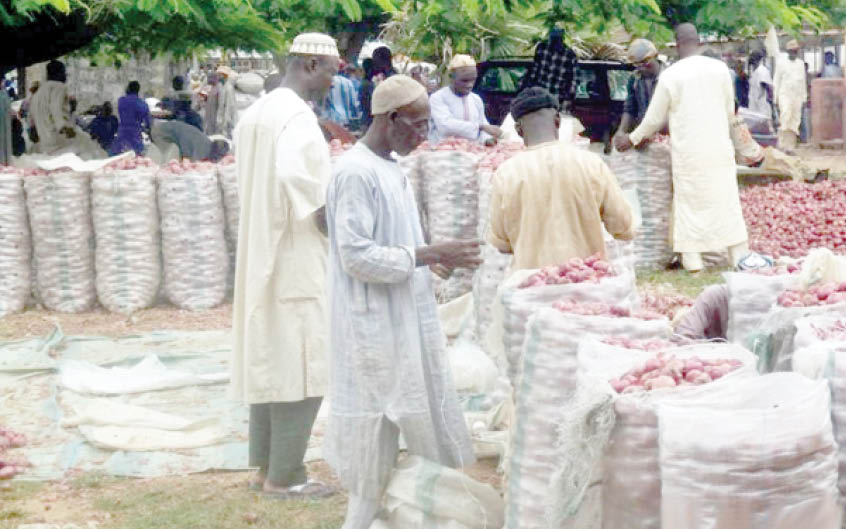Malam Muhammadu Dalhatu is a farmer in Gada, one of the areas that have been battling desert encroachment in Sokoto State.
Gada is the leading onion and garlic-producing area in the state and is sharing border with Niger Republic. They also produce guinea corns, millets and beans.
Kano farmers groan as dam water washes away farmlands
How population growth is causing river banks to expand in Nigeria
Speaking to Daily Trust on Sunday, Dalhatu revealed how desertification was threatening food production in the area.
“We are losing much of our yields as a result of this problem. We will plant our seeds, apply organic fertiliser but windstorm always comes to blow it away and destroy some of our plants. This is affecting our yields,” he said.
A former commissioner for environment in the state and district head of Kilgori, Dr Muhammad Jabbi, said 70 per cent of Sokoto State was prone to desertification, affecting over 50 per cent of its population.
Jabbi noted that evidences of desert encroachment were glaring at Sokoto-Illela, Illela-Gada and Goronyo-Sabonbirni roads, where one could not miss sight of heaps of advancing sand dunes often threatening the roads.
He added that symptoms of the menace manifested in decreased agricultural output, resulting into food insecurity, poverty, unemployment, social conflicts and rural-urban migration.
He said checkmating the situation was a gigantic task as it requires collective responsibility and action by individuals, communities, federal, state and local governments, the international community, as well as religious-based organisations, among others.
Dr Ayuba Dan-Asabe, an environmentalist and community health expert, attributed the development to illegal logging of trees, which he said had exposed the environment to all sorts of dangers.
Although there was no accurate data on the number of trees destroyed in the state every day, he said the rate was so alarming that serious measures needed to be put in place to curtail it.
“The negative impacts of such activities are there, exposing our land and houses. We don’t have enough vegetation and even the temperature of the micro environment will drop significantly.
“In cases where illegal logging is in deep forest, we will end up losing so much flora. I am talking about small plants and animals that could be used for medical purposes.
“Additionally, the uppermost part of the soil will be removed, and this will seriously affect food production because what you have planted may not have adequate nutrition that will support it to grow. So what you are going to get at the end of the day will be low. If, for instance, you are expecting, let’s say five to six tons of farm produce, you would end up getting half of a ton, and this is threatening food security because the populace may not have enough to eat or sell to solve other domestic problems,” he said.
He, however, said the implementation of laws alone would not save the environment, but a serious sensitisation on the negative impact of illegal felling of trees. He added that government should provide alternative to firewood and make it affordable for the poor.
The commissioner for environment, Aliyu Dandinmahe, also said they had recruited forest guards to check the menace.
“We also have a mobile court, which has been convicting offenders, including traditional rulers and other people in positions of authaurity.
“We make it mandatory for any person that wants to cut or even trim trees in front of his house to write to us, stating the reason he must do so. If we are not satisfied with his reason, we stop him, but if the reason is convincing we ask him to replace it but not necessary at its former spot,” he said.
Dandinmahe also said they had distributed 20,000 (6kg) gas cylinders and improved stoves to discourage felling of trees for domestic usage.
He further said there was a programme tagged “Re-greening Project” initiated to save endangered species from total extinction.
“We also organised a train-the-trainer workshop, where 20 people received training on the production of briquette as the alternative source of energy in the state,” he said.
In their bid to complement government’s efforts at conserving trees in the state, the Nigeria Union of Journalists (NUJ), in collaboration with the Shehu Maikoli Foundation and the Eco Africa Climate Change Foundation, signed a memorandum of understanding to implement a programme they tagged, “Go Green Project.”
Speaking at the ceremony, the founder of Maikoli Foundation, Altine Shehu Kajiji, explained that part of the aims of the project was to established 20 gardens in 10 junior secondary and primary schools across the state.
Others were roadside plantation, planting of indigenous trees in 10 communities vulnerable to climate change, distribution of moringa and other economic trees to women and households for home gardening, and inauguration of the Young Foresters Club in primary and junior secondary schools.
Kajiji further explained that the Go Green Project would foster green consciousness, educate and empower younger generation of environmental actors.
Shedding more light, the project manager, Aliyu Shehu Gwaddodi, said the programme was also aimed at preserving endangered species of economic trees
“The essence of this is to ensure regeneration of such species because we want our children and other generations that are coming to know them and their economic and medicinal values,” he said.
Also speaking, the state chairman of the NUJ, Dalhatu Safiyal-Magori, noted that they agreed to be part of the project because of the significance of trees in the conservation of the farmlands.
